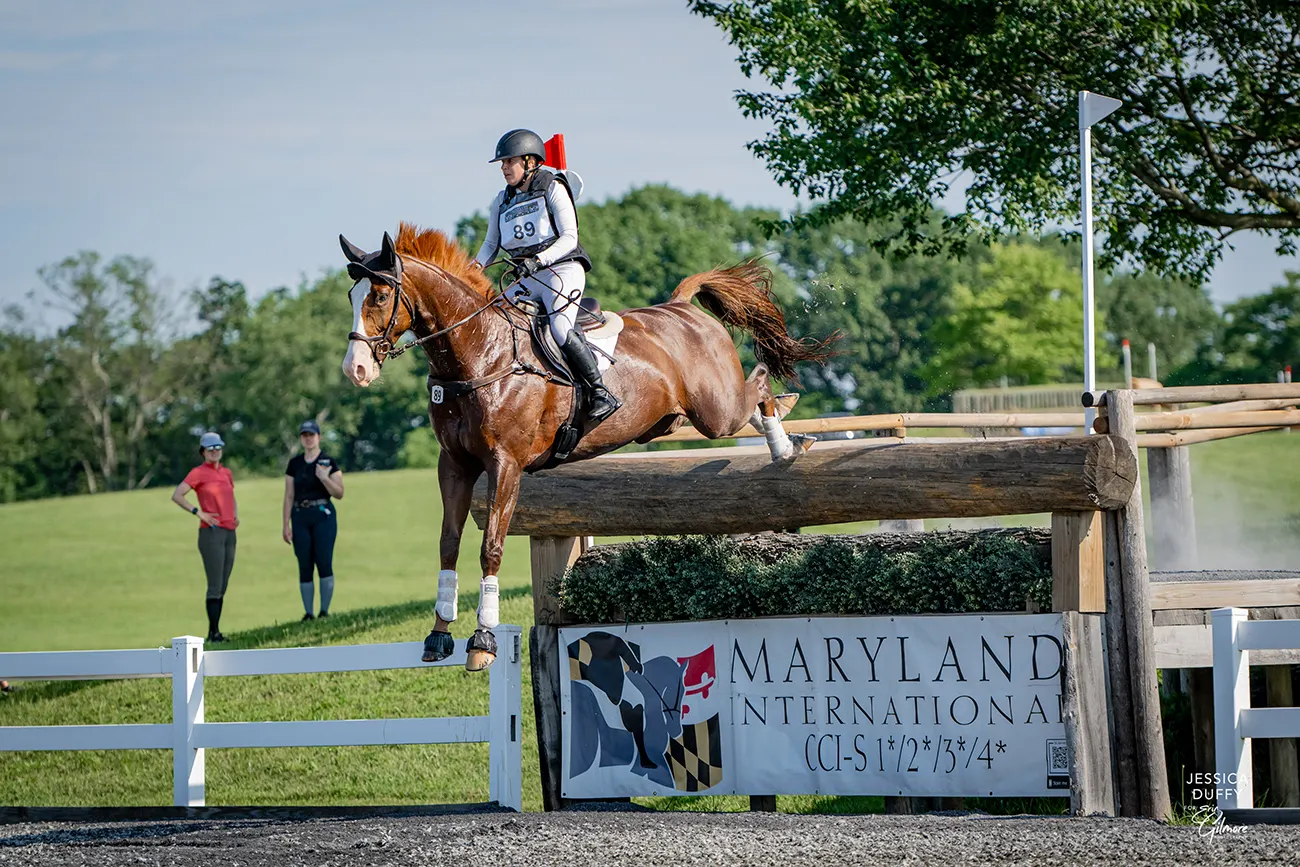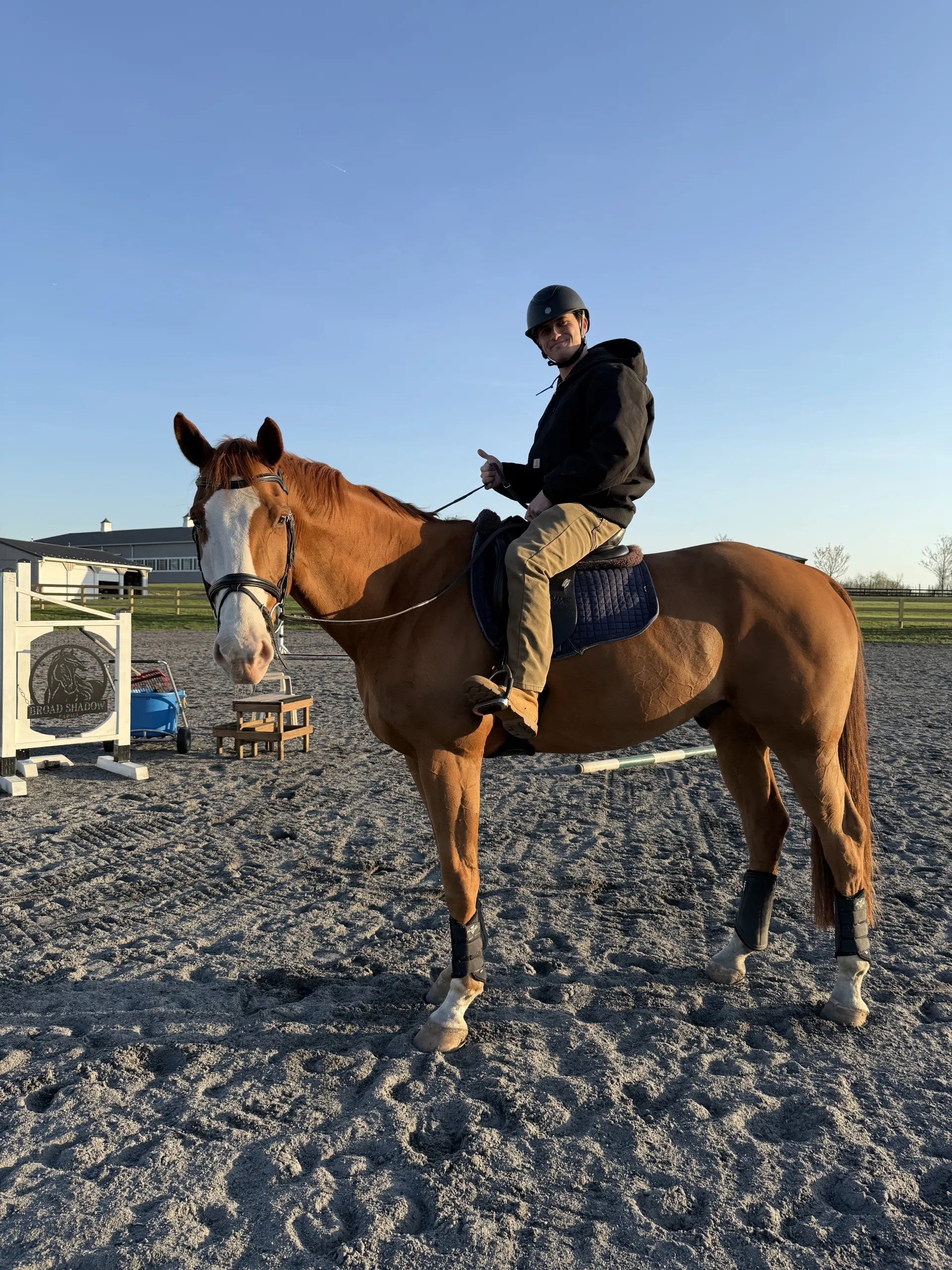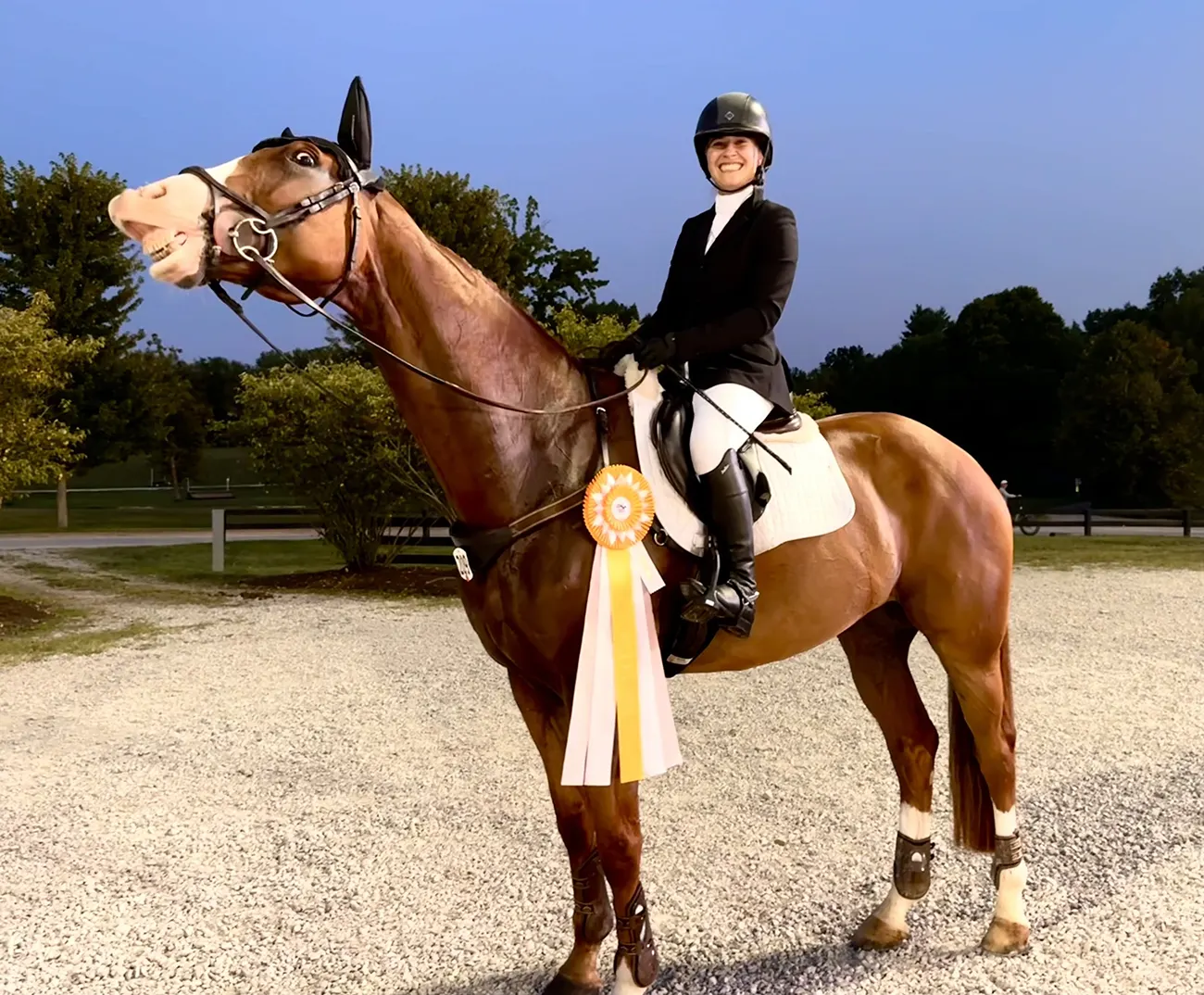Amateur rider Sara Schulman graduated from college in May 2020 with neither pomp nor circumstance; the early months of the COVID-19 pandemic had shut down the nation so her graduation ceremony from the University of Virginia didn’t take place until the following year. But her entrance into the workforce—virtually—in those early months of the pandemic provided her a unique opportunity to launch her career while simultaneously pursuing her dream of climbing to the top levels of eventing.
The journey hasn’t always been easy, but the successes she’s had with her equine partner Cooley Chromatic over the past few seasons have made that quest for balance more than worth its challenges. They are now competing successfully at the advanced level around her full-time job for mortgage giant Fannie Mae.
Back when she was an incoming college freshman, Schulman lasted just one horseless week at the University of Virginia before driving a few hours home to bring back a relatively green off-track Thoroughbred she’d purchased at the end of high school. Her parents—not horse people—hadn’t wanted their daughter to worry about either the time or the expense of a horse while adjusting to college life, but she assured them she could find balance between school and “Snip.”

A variety of part-time jobs enabled her to make equestrian ends meet.
“I did the afternoon feeding and chores at Kim Severson’s barn to work off board,” she said. “And I house-sat, rode a horse for a professor, and worked at Dover Saddlery, though it was easy to just spend my paycheck right there!”
Throughout college she rode on UVA’s eventing team but said it was relatively small, and they only competed together a few times each year. So Schulman focused on Snip’s training, starting out at novice. By her senior year they were competing successfully at the CCI2* level.
Snip, who was then 13, was maxing out, and Schulman knew her own ambitions were too big to ask of him. So she made the tough decision after a successful season to sell him, knowing those funds would help her buy her next partner.
During the first semester of her senior year, Schulman received a job offer. She signed on with Fannie Mae in the housing mortgage industry; she’d begin working in July 2020, shortly after graduating with her economics degree.
But then COVID hit, and Schulman learned that she’d start her new job remotely—with a significant amount of flexibility.
She took the funds from Snip’s sale and went to Ireland. She knew she couldn’t afford a made horse; her budget would allow, instead, for her to invest in a quality young prospect.
She took a chance on a leggy, red 3-year-old Oldenburg gelding named Cooley Chromatic (Thorgal—Castrade, Sandreo).
“It was a risk,” she said. “Getting a horse that young, I didn’t know if he would actually have the desire to be an upper-level event horse as I hopefully intended him to be, so I had to make sure he was marketable in general if I brought him back and he didn’t want to be an eventer.
“I watched him free jump over there [in Ireland] and while it’s hard to see a lot at that age, I could get a general sense of his natural athleticism. He was a beautiful mover,” she continued.
Working remotely allowed her to spend nearly every day of the week with her new partner, “Caden,” as well as continue to work as an assistant trainer to Jan Byyny, with whom she’d been riding and training.
ADVERTISEMENT
During those early years post-graduation, Schulman juggled her full-time, real-world career with long hours spent at the barn. She’d visit the barn twice a day to do chores and ride multiple horses around her day job.
“There were some jam-packed days and early mornings and late nights,” she said. “But I think that period of time was really instrumental for my own riding, Caden’s development, and in my relationship with him.”
For an amateur wanting to make it to the top levels of the sport, having just one horse was hindering her own progress as a rider—especially in the early years when Caden was still growing and his training had to be careful and slow.
“At first, he could really only flat for like 20 minutes at a time,” she said. “I had to curb my ambitions and not push him too much.”
But it’s hard to progress as an upper-level rider with a one-horse string.
Schulman credits Byyny for allowing her to ride and compete horses for Byyny and her clients, which gave her the additional saddle time she needed to develop her own skills. She still catch-rides when she can and appreciates the trust Byyny has in her to ride relatively unfamiliar horses in new environments.
Schulman realized Caden was a keeper at one of their first preliminary-level events.
“He’d always been super nervous over water jumps; he didn’t understand the question he was being asked,” she recalled. “I’d always had to school him through the water at every horse trial. But I have this picture of us jumping into the water, and I have a giant smile on my face because he’d popped in confidently.”
As they moved up the levels, it became clear that Caden was really enjoying his job and had the talent and drive to take the pair to the top levels of the sport.
“I started to noticed a change in him at the start box,” she said. “When we moved up to intermediate, he started to get really excited. He felt ambitious, and I hadn’t really felt that from him before.”
It’s Schulman’s boyfriend, Mike Dewhirst, who leads the bouncing duo most often to the start.

They’ve been dating for about a year and a half, and it seems like he might be a keeper, too. He’s an avid supporter of Schulman’s passion—a key, she says, for being able to balance a relationship with high-level riding.
“He was not a horse guy, but he’s turned into one,” she said. “He comes out to the barn with me often and thinks of Caden as ‘his friend.’ Two months into dating, I was in Florida for the season. We’d only been on a handful of dates, but he flew down to spend time with me. Six months in, he came with me to Bromont [(Quebec)].”
“He does just about everything now,” she continued. “He observes everything and just learns what the next step is. He grooms and helps bathe. He jogs horses out for people. He volunteers on his own to pick up poop, and he wipes snot out of Caden’s white nose. Often, I think he knows a course better than I do, and he’ll walk courses with me and suggest the lines I should take.”
It’s not just Dewhirst’s understanding and flexibility that helps Schulman find some sense of balance in her life.
ADVERTISEMENT
“You can’t do this unless you have people around you who understand the limitations of your schedule,” she said.
That includes Dewhirst but also Schulman’s trainers, who will meet her for lessons as early as 6 a.m., or the barn staff who may help with fitness rides if she can’t make it to the barn due to work, or her managers at Fannie Mae who allow her flexibility around competitions.

Her support system has been particularly helpful recently; in December, after more than four years of fully remote work, Schulman was offered a new position at Fannie Mae. It was great offer, she said, that would challenge and teach her. But the caveat was that it required in-person work in the Washington, D.C., office several days a week.
She weighed her options. She was scheduled to leave for the season in Florida just two weeks later. But the opportunities it offered her career were too great, and she decided to take the job.
“I was all ready [for Florida] and was on a riding high since 2024 with some great three-star results,” she said. “We were fourth in our first three-star long at Bromont in June [of 2024], then third in the intermediate division in that [USEA American Eventing Championships] in Kentucky, then second at the Maryland CCI3*-L.
“I was planning our move up to advanced,” she continued. “Then I had a job offer in my hands, a completely new job role in a more challenging area that I knew was going to be interesting and rewarding. I knew it was a privileged position to be in, to have a great job offer and an amazing horse. But it was hard at the time to make the decision.”
For Schulman, there was a bigger adjustment than a new role within the company: This was the first time in her career that she would have to report regularly to an office or navigate a commute.
“I actually had to move and find an apartment on the Metro line,” she said. “I have a pickup truck, and knew I’d never fit into any D.C. parking garages!”
She’s continuing to navigate the balance between the new job and the horse world.
On days when she works from home, she fights her self-proclaimed “non-morning-person” nature and often rides before work. On days that she makes the 75-minute commute by Metro train from Herndon, Virginia, to her downtown office, she rides in the evening, usually not making it to the barn before 7 p.m.
“I try to make it to the barn six days a week,” she said. “But I’m also trying to be better about socializing, whether it’s with friends or Mike.
“And when I accepted the offer in December, I made it really clear to my new manager that I ride competitively, and it’s a priority,” she added. “He’s really supportive, and I still have flexibility in the job.”
Despite the new job and new obligations, Schulman and Caden made their advanced debut—just in Maryland instead of Florida. After moving up at the Fair Hill International April Horse Trials, they notched their first advanced-level win in June, topping the division at the Maryland International and Horse Trials, held June 27-29 in Adamstown.
“I love the job I’m in now,” she said, “but it’s always going to be a challenge to balance my career and my riding. I got a lot of exposure and spent a lot of time in the horse world. I have an amazing horse, and if I have a season where I’m a little behind [due to work], we have lots more seasons ahead of us. It’s never going to truly be 50/50, but I’ll keep trying to find that balance.”














